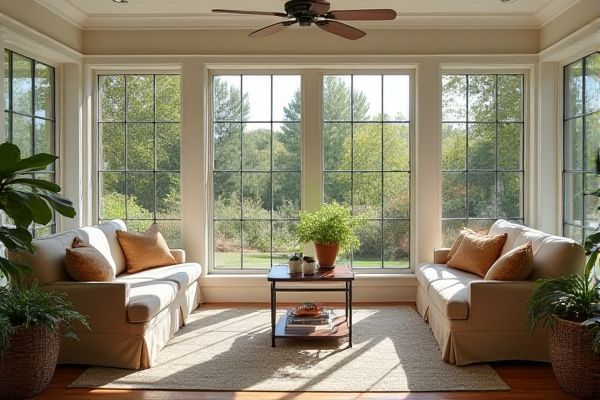
Vinyl sunrooms offer superior insulation and low maintenance, making them energy-efficient and long-lasting, while aluminum sunrooms provide a lightweight, durable frame with a modern aesthetic but may require more upkeep due to potential corrosion. Explore the rest of the article to determine which sunroom material best suits Your home and lifestyle needs.
Table of Comparison
| Feature | Vinyl Sunroom | Aluminum Sunroom |
|---|---|---|
| Material Composition | Durable PVC-based vinyl | Lightweight, rust-resistant aluminum |
| Durability | Resistant to moisture and rot | Highly resistant to corrosion and weather |
| Maintenance | Low maintenance, cleans easily | Requires occasional cleaning and inspection |
| Insulation | Better thermal insulation, energy efficient | Less insulating, prone to heat transfer |
| Cost | Generally more affordable | Typically higher initial cost |
| Appearance | Thick frames, limited color options | Sleek, modern look with customizable finishes |
| Installation | Moderate difficulty, lightweight | Requires professional installation due to weight |
| Lifespan | 15-25 years with proper care | 25+ years, highly durable |
Introduction to Vinyl and Aluminum Sunrooms
Vinyl sunrooms offer excellent insulation and low maintenance due to their durable, weather-resistant material, making them ideal for energy efficiency and comfort. Aluminum sunrooms provide superior structural strength and a sleek, modern appearance, with resistance to corrosion and minimal upkeep requirements. Choosing between vinyl and aluminum depends on priorities such as thermal performance, aesthetic preference, and long-term durability.
Key Differences Between Vinyl and Aluminum Sunrooms
Vinyl sunrooms offer superior insulation and energy efficiency due to their non-metallic composition, making them ideal for maintaining indoor temperature and reducing utility costs. Aluminum sunrooms stand out for their durability and strength, providing better resistance to rust, corrosion, and structural impacts in harsh weather conditions. While vinyl requires less maintenance and resists fading, aluminum allows for slimmer frames and larger glass panels, enhancing natural light and outdoor views.
Durability and Longevity Comparison
Vinyl sunrooms offer excellent resistance to moisture, rust, and corrosion, making them ideal for humid environments and ensuring a longer lifespan with minimal maintenance. Aluminum sunrooms boast superior strength and can withstand extreme weather conditions, including heavy snow and high winds, but they may be prone to denting and fading over time. Your choice between vinyl and aluminum should consider the balance between vinyl's corrosion resistance and aluminum's structural durability for lasting sunroom performance.
Insulation and Energy Efficiency
Vinyl sunrooms offer superior insulation due to their low thermal conductivity, which helps maintain consistent indoor temperatures and reduces energy costs. Aluminum sunrooms, while durable, conduct heat and cold more readily, leading to potential energy loss and higher heating or cooling expenses. Choosing a vinyl sunroom can enhance your comfort and energy efficiency, making it a smarter investment for temperature regulation.
Maintenance Requirements
Vinyl sunrooms require minimal maintenance due to their resistance to rust, fading, and warping, making them ideal for long-term durability with occasional cleaning. Aluminum sunrooms, while lightweight and strong, may need periodic repainting or corrosion treatment, especially in humid or coastal environments. Both materials offer low maintenance compared to wood, but vinyl's inherent weather resistance generally results in fewer upkeep tasks.
Cost Analysis: Vinyl vs Aluminum Sunrooms
Vinyl sunrooms typically offer a lower upfront cost compared to aluminum sunrooms, making them a budget-friendly option for many homeowners. While aluminum sunrooms tend to have higher durability and lower maintenance costs over time, vinyl can save you money initially with easier installation and less expensive materials. Evaluating your long-term investment, aluminum may provide better value due to its resistance to rust and weathering, whereas vinyl excels in cost efficiency and insulation performance.
Aesthetic Appeal and Design Options
Vinyl sunrooms offer a wide range of color choices and a smooth, seamless finish that enhances modern and traditional home styles, while aluminum sunrooms provide a sleek, contemporary look with slim framing that maximizes natural light. Vinyl's ability to mimic wood grain adds warmth and texture, making it ideal for those seeking a cozy, inviting space. Your preference may hinge on whether you prioritize customizable aesthetics and insulation (vinyl) or minimalist design with durable, lightweight materials (aluminum).
Installation Process and Timeline
Vinyl sunrooms often feature a simpler installation process due to their lightweight panels and interlocking design, typically completing within one to three days. Aluminum sunrooms require more precise measuring and assembly, involving heavier framing components that may extend installation to three to five days. Both materials demand professional expertise, but vinyl's modular nature can accelerate setup, reducing labor time and potential delays.
Weather Resistance and Climate Suitability
Vinyl sunrooms offer exceptional weather resistance due to their ability to expand and contract with temperature changes, making them ideal for varied climates with fluctuating temperatures. Aluminum sunrooms excel in durability against extreme weather conditions such as heavy rain, snow, and strong winds, providing a sturdy and low-maintenance option in coastal or harsh environments. Your choice depends on the specific climate of your area and the level of weather resilience you require for long-lasting performance.
Choosing the Right Sunroom Material for Your Needs
Vinyl sunrooms offer superior insulation and low maintenance, making them ideal for energy efficiency and durability in various climates. Aluminum sunrooms provide exceptional strength and a sleek, modern appearance, perfect for withstanding harsh weather conditions and supporting larger glass panels. Selecting the right sunroom material depends on your priorities for thermal performance, aesthetic preferences, and long-term upkeep costs.
 homyna.com
homyna.com